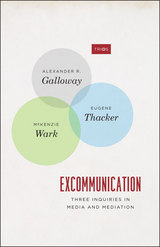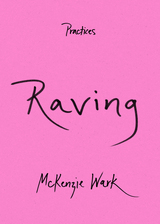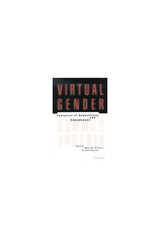

Listen to a short interview with McKenzie WarkHost: Chris Gondek | Producer: Heron & Crane
Ever get the feeling that life's a game with changing rules and no clear sides, one you are compelled to play yet cannot win? Welcome to gamespace. Gamespace is where and how we live today. It is everywhere and nowhere: the main chance, the best shot, the big leagues, the only game in town. In a world thus configured, McKenzie Wark contends, digital computer games are the emergent cultural form of the times. Where others argue obsessively over violence in games, Wark approaches them as a utopian version of the world in which we actually live. Playing against the machine on a game console, we enjoy the only truly level playing field--where we get ahead on our strengths or not at all.
Gamer Theory uncovers the significance of games in the gap between the near-perfection of actual games and the highly imperfect gamespace of everyday life in the rat race of free-market society. The book depicts a world becoming an inescapable series of less and less perfect games. This world gives rise to a new persona. In place of the subject or citizen stands the gamer. As all previous such personae had their breviaries and manuals, Gamer Theory seeks to offer guidance for thinking within this new character. Neither a strategy guide nor a cheat sheet for improving one's score or skills, the book is instead a primer in thinking about a world made over as a gamespace, recast as an imperfect copy of the game.

A double is haunting the world--the double of abstraction, the virtual reality of information, programming or poetry, math or music, curves or colorings upon which the fortunes of states and armies, companies and communities now depend. The bold aim of this book is to make manifest the origins, purpose, and interests of the emerging class responsible for making this new world--for producing the new concepts, new perceptions, and new sensations out of the stuff of raw data.
A Hacker Manifesto deftly defines the fraught territory between the ever more strident demands by drug and media companies for protection of their patents and copyrights and the pervasive popular culture of file sharing and pirating. This vexed ground, the realm of so-called "intellectual property," gives rise to a whole new kind of class conflict, one that pits the creators of information--the hacker class of researchers and authors, artists and biologists, chemists and musicians, philosophers and programmers--against a possessing class who would monopolize what the hacker produces.
Drawing in equal measure on Guy Debord and Gilles Deleuze, A Hacker Manifesto offers a systematic restatement of Marxist thought for the age of cyberspace and globalization. In the widespread revolt against commodified information, McKenzie Wark sees a utopian promise, beyond the property form, and a new progressive class, the hacker class, who voice a shared interest in a new information commons.



READERS
Browse our collection.
PUBLISHERS
See BiblioVault's publisher services.
STUDENT SERVICES
Files for college accessibility offices.
UChicago Accessibility Resources
home | accessibility | search | about | contact us
BiblioVault ® 2001 - 2025
The University of Chicago Press









